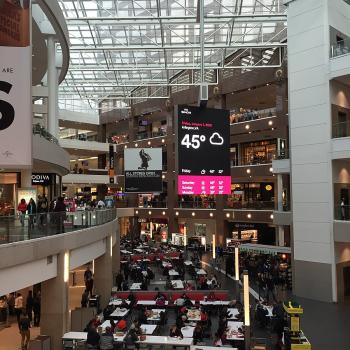from Jeff Deeney. First, in July 2013:
Last year when American Paradigm Schools took over Philadelphia’s infamous, failing John Paul Jones Middle School, they did something a lot of people would find inconceivable. The school was known as “Jones Jail” for its reputation of violence and disorder, and because the building physically resembled a youth correctional facility. Situated in the Kensington section of the city, it drew students from the heart of a desperately poor hub of injection drug users and street level prostitution where gun violence rates are off the charts. But rather than beef up the already heavy security to ensure safety and restore order, American Paradigm stripped it away. During renovations, they removed the metal detectors and barred windows.
The police predicted chaos. But instead, new numbers seem to show that in a single year, the number of serious incidents fell by 90%.
The school says it wasn’t just the humanizing physical makeover of the facility that helped. Memphis Street Academy also credits the Alternatives to Violence Project (AVP), a noncoercive, nonviolent conflict resolution regimen originally used in prison settings that was later adapted to violent schools. AVP, when tailored to school settings, emphasizes student empowerment, relationship building and anger management over institutional control and surveillance. There are no aggressive security guards in schools using the AVP model; instead they have engagement coaches, who provide support, encouragement, and a sense of safety.
more; and then January of this year:
…Of course, many readers were skeptical of such a precipitous drop in such a short time. Maybe the school under-reported violent incidents. Maybe with no security guards violent incidents aren’t getting reported at all. But since the story ran more corroborating information has come from the police department to support the school’s claims. Since Memphis Street Academy initiated restorative practices, the police department says they no longer need to send the 11 patrol officers they used to send every day to oversee the hectic and potentially explosive dismissal time. The police department has been able to begin serving other schools in the area, which used to get barely any resources even when reporting something as serious as a student being hit by a car because the need for security at the old Jones Jail was so great. Juvenile crime rates in the immediate area are down, as are truancy and curfew violations. Officers are freed up to focus on the considerable amount of violent crime that can jump off at any time of day in this drug- and gun-ridden part of the city. At neighborhood town halls citizens reportedly praise students and the school for having solved a persistent neighborhood nuisance. Memphis Street Academy CEO Christine Borelli says the school’s restorative practices continue having a major impact. “We only have 2 serious incidents that require police involvement thus far this year.”
Now imagine if Jones Jail had decided to go with harsher enforcement instead of restorative practices. Of course, that’s disregarding the fact that many Philadelphia schools have long had very martial approaches to discipline and extremely tight security with linkages to school police, truant officers, and juvenile probation and still suffered a tremendous violence epidemic over the years. But if Jones Jail had instead taken on some of the harsher zero-tolerance policies that predominate, such as automatic suspensions for minor infractions like tardiness, in order to forcibly impose order? Then the school would only send more of the most at-risk children home, where they would be deprived of instruction time and exposed to more social pathology that predominates in their neighborhood.
Junior high kids hanging out in the West Kensington neighborhood that feeds into Memphis Street Academy instead of being in school are more likely to be recruited as look-outs and runners by the older kids who sell drugs on nearly every block. If there is violence in their homes, which considering the rates of domestic violence in the neighborhood are not unlikely, they’re more likely to be exposed to even more of it. If there’s no food in the house, which is distinctly possible, considering that food scarcity is a major problem in North Philadelphia, they’ll go without the school lunch they would have received. And receiving punitive messages from an institution you’re already ambivalent about can be enough to push a struggling student away from school altogether—from any school.
As a social worker I’ve worked both in public schools and in the criminal justice system, so I’ve seen what it’s like at both ends of the pipeline. I remember arriving for the first time at the probation department and immediately thinking that it was uncannily similar to the public high school I worked in just before I took the job.











